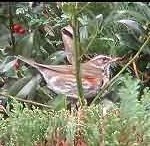Organic farms are better for wildlife than those run conventionally, according to a study covering 180 farms from Cornwall to Cumbria.
The organic farms were found to contain 85% more plant species, 33% more bats, 17% more spiders and 5% more birds.
Funded by the government, it was the largest ever survey of organic farming.
"The exclusion of synthetic pesticides and fertilisers from organic is a fundamental difference between systems," the study says.
Other key differences found on the organic farms included smaller fields, more grasslands and hedges that are taller, thicker and on average 71% longer.
Dr Lisa Norton, of the Centre for Ecology & Hydrology, said: "Hedges are full of native, berry-producing shrubs, which are great for insects and the birds and bats that feed on them."
Soil Association policy manager Gundula Azeez
Increased biodiversity was a "happy by-product" of sustainable farming practices and farmers working with "natural processes" to increase productivity, she added.
The fact the organic arable farms were more likely to have livestock on them also made them richer habitats for wildlife.
The study's lead author, British Trust for Ornithology habitat research director Dr Rob Fuller, told BBC News: "There were very large benefits right across the species spectrum."
The study had looked at a "very, very high" proportion of England's organic arable farms, he said.
More organic farming would help "restore biodiversity within agricultural landscapes", Dr Fuller added.
"Less than 3% of English farmland is organic so there is plenty of scope for an increase in area."
Soil Association policy manager Gundula Azeez said: "A greater area of organically-managed land in the UK would help restore the farmland wildlife that has been lost from our countryside in recent decades with intensive farming."




